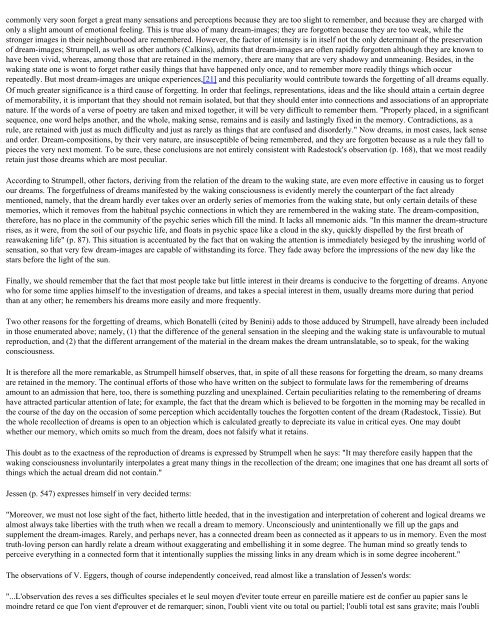The Interpretation of Dreams Sigmund Freud (1900)
The Interpretation of Dreams Sigmund Freud (1900)
The Interpretation of Dreams Sigmund Freud (1900)
You also want an ePaper? Increase the reach of your titles
YUMPU automatically turns print PDFs into web optimized ePapers that Google loves.
commonly very soon forget a great many sensations and perceptions because they are too slight to remember, and because they are charged with<br />
only a slight amount <strong>of</strong> emotional feeling. This is true also <strong>of</strong> many dream-images; they are forgotten because they are too weak, while the<br />
stronger images in their neighbourhood are remembered. However, the factor <strong>of</strong> intensity is in itself not the only determinant <strong>of</strong> the preservation<br />
<strong>of</strong> dream-images; Strumpell, as well as other authors (Calkins), admits that dream-images are <strong>of</strong>ten rapidly forgotten although they are known to<br />
have been vivid, whereas, among those that are retained in the memory, there are many that are very shadowy and unmeaning. Besides, in the<br />
waking state one is wont to forget rather easily things that have happened only once, and to remember more readily things which occur<br />
repeatedly. But most dream-images are unique experiences,[21] and this peculiarity would contribute towards the forgetting <strong>of</strong> all dreams equally.<br />
Of much greater significance is a third cause <strong>of</strong> forgetting. In order that feelings, representations, ideas and the like should attain a certain degree<br />
<strong>of</strong> memorability, it is important that they should not remain isolated, but that they should enter into connections and associations <strong>of</strong> an appropriate<br />
nature. If the words <strong>of</strong> a verse <strong>of</strong> poetry are taken and mixed together, it will be very difficult to remember them. "Properly placed, in a significant<br />
sequence, one word helps another, and the whole, making sense, remains and is easily and lastingly fixed in the memory. Contradictions, as a<br />
rule, are retained with just as much difficulty and just as rarely as things that are confused and disorderly." Now dreams, in most cases, lack sense<br />
and order. Dream-compositions, by their very nature, are insusceptible <strong>of</strong> being remembered, and they are forgotten because as a rule they fall to<br />
pieces the very next moment. To be sure, these conclusions are not entirely consistent with Radestock's observation (p. 168), that we most readily<br />
retain just those dreams which are most peculiar.<br />
According to Strumpell, other factors, deriving from the relation <strong>of</strong> the dream to the waking state, are even more effective in causing us to forget<br />
our dreams. <strong>The</strong> forgetfulness <strong>of</strong> dreams manifested by the waking consciousness is evidently merely the counterpart <strong>of</strong> the fact already<br />
mentioned, namely, that the dream hardly ever takes over an orderly series <strong>of</strong> memories from the waking state, but only certain details <strong>of</strong> these<br />
memories, which it removes from the habitual psychic connections in which they are remembered in the waking state. <strong>The</strong> dream-composition,<br />
therefore, has no place in the community <strong>of</strong> the psychic series which fill the mind. It lacks all mnemonic aids. "In this manner the dream-structure<br />
rises, as it were, from the soil <strong>of</strong> our psychic life, and floats in psychic space like a cloud in the sky, quickly dispelled by the first breath <strong>of</strong><br />
reawakening life" (p. 87). This situation is accentuated by the fact that on waking the attention is immediately besieged by the inrushing world <strong>of</strong><br />
sensation, so that very few dream-images are capable <strong>of</strong> withstanding its force. <strong>The</strong>y fade away before the impressions <strong>of</strong> the new day like the<br />
stars before the light <strong>of</strong> the sun.<br />
Finally, we should remember that the fact that most people take but little interest in their dreams is conducive to the forgetting <strong>of</strong> dreams. Anyone<br />
who for some time applies himself to the investigation <strong>of</strong> dreams, and takes a special interest in them, usually dreams more during that period<br />
than at any other; he remembers his dreams more easily and more frequently.<br />
Two other reasons for the forgetting <strong>of</strong> dreams, which Bonatelli (cited by Benini) adds to those adduced by Strumpell, have already been included<br />
in those enumerated above; namely, (1) that the difference <strong>of</strong> the general sensation in the sleeping and the waking state is unfavourable to mutual<br />
reproduction, and (2) that the different arrangement <strong>of</strong> the material in the dream makes the dream untranslatable, so to speak, for the waking<br />
consciousness.<br />
It is therefore all the more remarkable, as Strumpell himself observes, that, in spite <strong>of</strong> all these reasons for forgetting the dream, so many dreams<br />
are retained in the memory. <strong>The</strong> continual efforts <strong>of</strong> those who have written on the subject to formulate laws for the remembering <strong>of</strong> dreams<br />
amount to an admission that here, too, there is something puzzling and unexplained. Certain peculiarities relating to the remembering <strong>of</strong> dreams<br />
have attracted particular attention <strong>of</strong> late; for example, the fact that the dream which is believed to be forgotten in the morning may be recalled in<br />
the course <strong>of</strong> the day on the occasion <strong>of</strong> some perception which accidentally touches the forgotten content <strong>of</strong> the dream (Radestock, Tissie). But<br />
the whole recollection <strong>of</strong> dreams is open to an objection which is calculated greatly to depreciate its value in critical eyes. One may doubt<br />
whether our memory, which omits so much from the dream, does not falsify what it retains.<br />
This doubt as to the exactness <strong>of</strong> the reproduction <strong>of</strong> dreams is expressed by Strumpell when he says: "It may therefore easily happen that the<br />
waking consciousness involuntarily interpolates a great many things in the recollection <strong>of</strong> the dream; one imagines that one has dreamt all sorts <strong>of</strong><br />
things which the actual dream did not contain."<br />
Jessen (p. 547) expresses himself in very decided terms:<br />
"Moreover, we must not lose sight <strong>of</strong> the fact, hitherto little heeded, that in the investigation and interpretation <strong>of</strong> coherent and logical dreams we<br />
almost always take liberties with the truth when we recall a dream to memory. Unconsciously and unintentionally we fill up the gaps and<br />
supplement the dream-images. Rarely, and perhaps never, has a connected dream been as connected as it appears to us in memory. Even the most<br />
truth-loving person can hardly relate a dream without exaggerating and embellishing it in some degree. <strong>The</strong> human mind so greatly tends to<br />
perceive everything in a connected form that it intentionally supplies the missing links in any dream which is in some degree incoherent."<br />
<strong>The</strong> observations <strong>of</strong> V. Eggers, though <strong>of</strong> course independently conceived, read almost like a translation <strong>of</strong> Jessen's words:<br />
"...L'observation des reves a ses difficultes speciales et le seul moyen d'eviter toute erreur en pareille matiere est de confier au papier sans le<br />
moindre retard ce que l'on vient d'eprouver et de remarquer; sinon, l'oubli vient vite ou total ou partiel; l'oubli total est sans gravite; mais l'oubli









